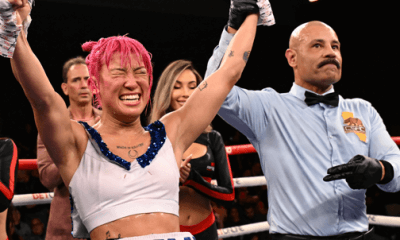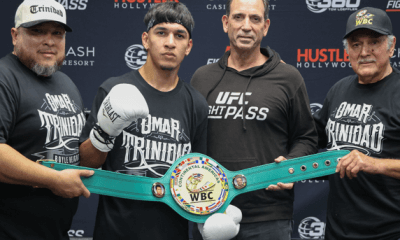Featured Articles
Will the COVID-19 Pandemic Hobble Boxing? There’s a Precedent for It

Will the COVID-19 Pandemic Hobble Boxing? There’s a Precedent for It
“Influenza Halts Boxing Activity” read the headline above an Oct. 13, 1918 story in the New York Times. “Promoters in Philadelphia, Boston, and New Jersey, in compliance with their different Health Departments, have agreed to close up shop,” read the story. “How long the sport will be idle remains to be seen, but it is positive that no matches of any importance will be undertaken while the (Spanish flu) epidemic continues.”
The epidemic was misnamed. It may have actually originated at Fort Riley, a U.S. military reservation in northwest Kansas. This wasn’t merely an epidemic but a pandemic, and ultimately the most awful pandemic afflicting mankind the 20th century, killing many more people than in the conterminous war raging in Europe, an estimated 675,000 deaths in the United States alone.
I wouldn’t want to compare the current situation regarding COVID-19, the coronavirus, with the great pandemic that struck with particular vehemence in the final months of World War I. That would be akin to crying fire in a crowded theater. Workers in the various health professions have more advanced tools at their disposal nowadays. Moreover, back then there was a shortage of nurses and doctors in the U.S. because so many were in the military.
But nonetheless, reports are troubling.
According to an Associated Press article published on March 2, the coronavirus has spread to more than 60 countries, infecting more than 88,000, of whom more than 3,000 have died. Ground Zero is the Hubei Province in China, home to the flashpoint city of Wuhan, which accounts for more than 90 percent of the deaths and more than 95 percent of the recorded infections. The economic effects have been devastating, particularly in countries like Italy where the economy is so heavily dependent on tourism.
What hasn’t changed in over 100 years are the recommended precautions that people are advised to take to diminish their risk of exposure. In 1918, Royal S. Copeland, the New York City Health Commissioner, came out with a list of do’s and don’ts. The first two entries were “Keep away from the cougher, sneezer, and spitter who does not use a handkerchief” and “Keep out of crowds whenever possible.” If one resided close to one’s workplace, it was recommended that one walk to work rather than use public transportation.
The cessation of boxing in Philadelphia came on the heels of an edict by the Pennsylvania Health Department that closed every place of amusement in the Keystone State to prevent large crowds from forming. As I write this, both Disney amusement parks in Tokyo are closed until further notice as is the Louvre in Paris, which has 2300 employees.
At the time of the embargo, the fight attracting the most buzz was the match between Salt Lake City knockout artist Jack Dempsey and veteran campaigner Battling Levinsky. It was originally scheduled for Oct. 9, 1918 at Shibe Park, the home of the Philadelphia Athletics baseball team. With Philadelphians encouraged to avoid non-essential travel, the promoters quickly realized that this venue was too large and shifted the fight to an indoor arena before they had to postpone it.
Here’s the good news. In Philadelphia, the order prohibiting boxing matches was quickly rescinded. Dempsey and Levinsky fought on Nov. 6. Dempsey knocked Levinsky out in the third round with a roundhouse right to the jaw and had two more fights in Philadelphia before the year was out. The following year he annihilated Jess Willard to win the world heavyweight title in a match that would set records for attendance and gate receipts – records that would soon be shattered. And so, the fallow in boxing resulting from the twin burdens of war and disease gave way to the sport’s most glorious era.
Boxing, of course, wasn’t the only major sport impacted by the spread of the so-called Spanish flu. College football was especially hurt with only a handful of teams playing a full schedule. The decision to cancel games was made easier by the fact that so many coaches and players had enlisted or been drafted into the Army.
The stock market roared back today (Monday, March 2) after a dismal week in which the Dow Jones plunged 14 percent from a recent high, the worst weekly decline since 2008. Hopefully that’s a sign that the COVID-19 scourge is abating. In the meantime, boxing promoters around the world — indeed, sports promoters of all stripes — are keeping a wary eye on the situation.
Check out more boxing news on video at The Boxing Channel
To comment on this story in The Fight Forum CLICK HERE
-

 Featured Articles3 weeks ago
Featured Articles3 weeks agoThe Hauser Report: Zayas-Garcia, Pacquiao, Usyk, and the NYSAC
-

 Featured Articles2 weeks ago
Featured Articles2 weeks agoOscar Duarte and Regis Prograis Prevail on an Action-Packed Fight Card in Chicago
-

 Featured Articles1 week ago
Featured Articles1 week agoThe Hauser Report: Cinematic and Literary Notes
-

 Book Review5 days ago
Book Review5 days agoMark Kriegel’s New Book About Mike Tyson is a Must-Read
-

 Featured Articles4 weeks ago
Featured Articles4 weeks agoManny Pacquiao and Mario Barrios Fight to a Draw; Fundora stops Tim Tszyu
-

 Featured Articles4 weeks ago
Featured Articles4 weeks agoArne’s Almanac: Pacquiao-Barrios Redux
-

 Featured Articles3 weeks ago
Featured Articles3 weeks agoRemembering Dwight Muhammad Qawi (1953-2025) and his Triumphant Return to Prison
-

 Featured Articles4 weeks ago
Featured Articles4 weeks agoOleksandr Usyk Continues to Amaze; KOs Daniel Dubois in 5 One-Sided Rounds


















